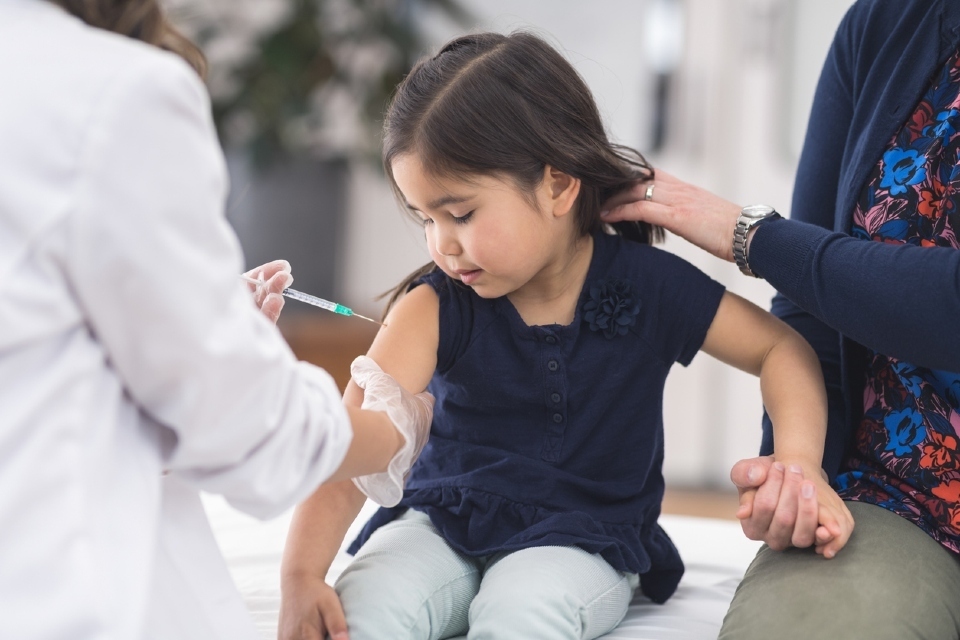
Parents warned about dangers of children missing vaccines
Published By GOV.UK [English], Thu, Sep 29, 2022 7:07 AM
The UK Health Security Agency (UKHSA) is urging parents and guardians to ensure their children are up to date with all their routine childhood immunisations including polio and measles, mumps and rubella (MMR) vaccinations. This comes as new data shows vaccination coverage for young children fell last year for virtually all programmes.
Vaccination rates have fallen over several years and additional disruption caused by the coronavirus (COVID-19) pandemic, beginning in March 2020, is likely to have caused some of the decreases in vaccine coverage seen in 2020 to 2021 and 2021 to 2022 compared to earlier years.
It is important vaccination coverage is recovered as soon as possible to levels recommended by the World Health Organization (WHO) of 95% for all childhood immunisation programmes to help prevent the spread of avoidable serious – and sometimes deadly – diseases such as measles and polio.
The latest vaccination statistics from UKHSA and NHS Digital for children up to 5 years of age in the UK (COVER programme) show coverage decreased for 13 out of the 14 routine vaccination programmes measured in 2021 to 2022.
Only 89.2% of children at 24 months had completed their first dose of the MMR vaccine, which is a decrease from 90.3% in the previous year.
Coverage for the second dose of MMR by age 5 years was also down by nearly 1%.
Coverage for the first dose of MMR at 24 months was less than 90% in 61 (out of 149) local authorities.
Coverage also decreased for the 6-in-1 and 5-in-1 vaccine, which protects against diphtheria, pertussis, tetanus, polio, disease caused by Haemophilus influenzae type b and hepatitis B, among children aged 12 months, 24 months, and 5 years.
Since the introduction of the measles vaccine in 1968 it is estimated that 20 million measles cases and 4,500 deaths have been prevented in the UK.
Measles is highly contagious so even a small decline in MMR uptake can lead to a rise in cases. Since international travel has resumed closer to pre-pandemic levels, it is more likely that measles will be brought in from countries that have higher levels of the disease and cause outbreaks.
Measles can lead to complications such as ear infections, pneumonia, and inflammation of the brain which require hospitalisation and on rare occasions can lead to long term disability or death.
The NHS is running a MMR catch-up campaign so some parents may be contacted directly.
Low polio vaccination rates in parts of London have left communities vulnerable to the spread of poliovirus, which has been detected in parts of North and East London through sewage surveillance. To date, no clinical cases of polio have been identified but health services have been urged to remain vigilant to any cases of paralysis in children.
A polio vaccination campaign, recommended by the expert immunisation committee JCVI, is under way in London for all 1- to 9-year-olds, either as a booster dose or catch-up and it’s important all parents take up this offer as soon as possible to help protect their child.
Dr Vanessa Saliba, Consultant epidemiologist at UKHSA, said:
Measles is highly contagious and can be dangerous, and it is extremely worrying that we are seeing levels of uptake of the MMR vaccine falling among young children. It is also vitally important that children get their polio vaccinations to help prevent the risk of paralysis.
I would urge parents to check that all children are up to date with their vaccines, and if not to get them booked in as soon as possible to make sure they have maximum protection against what can be terrible diseases.
Childhood vaccines also boost population immunity levels, helping prevent outbreaks, so by taking up all vaccinations for our children, we play our part in keeping these diseases confined to the past.
Anyone who is unsure if their child is up to date with all their routine vaccinations should check their child’s red book (personal child health record) in the first instance. If you are still not sure, or if you need to bring your child up to date with their vaccines, contact your GP practice to check and book an appointment.
To find out more about childhood vaccinations, please visit the NHS website.
UK Health Security Agency press office
Nobel House
17 Smith Square
London
SW1P 3JR
Telephone
020 7654 8400
Out of hours
020 8200 4400
Press release distributed by Media Pigeon on behalf of GOV.UK, on Sep 29, 2022. For more information subscribe and follow